
Having happiness isn’t just a random event. Psychologists have done a lot of studies and come up with processes and steps that you can follow to create happiness in your life. Many middle age men and women feel that when they hit this time period, they will be less happy than before, but that’s not necessarily true. In fact, they can actually be happier if they choose to follow the steps in this section instead of just hoping they’ll be happy.
To make this section of my course more meaningful, read the information below and then incorporate the processes into your Goals and also your Morning Rituals, which are covered in other sections of this course.
Happiness. It seems so obvious. Everyone knows what happiness is. Or do they? Do you?
If you stop and think about it (a very-good idea), happiness seems to largely be sort-of random. Of course, if your favorite team wins, you get a raise at work, you meet that cute guy, or you’re on vacation, you’ll (probably) be happy. Same goes for being with your significant other (maybe), your family (also maybe) or hanging out with the guys or gals (hopefully).
Unfortunately, some (many?) of us wind up chasing after external acquisitions that we believe will finally bring us happiness: “Once I get my new Mercedes, I’ll be able to get any girl/guy I want”; “When I’m made CEO, I’ll be able to buy anything I want”, and so it goes.
But these are all external circumstances that are causes for happiness. Is “happiness” just some random feeling that you hope you’ll get from time to time, which is sometimes not as good as you’d thought it would be, and which will come and go seemingly of its own will?.
Of course, some things seem to bring us predictable happiness. A new car, a new house, a new girlfriend or boyfriend, or other acquisitions or events. But after a while, the happiness usually wears off; have you noticed? And so we’re left wanting this elusive thing called happiness. In reality, happiness is paramount to everything. Even if our house burned down, or we had a terminal illness, if we were happy, everything would be OK, right?
Although happiness is a timeless and universal human quest, only in recent years has scientific research turned its focus on how happiness can be created, sustained and increased. Science has now confirmed that with certain practices we can change the neural pathways of our brain. Happiness is a set of skills we can learn through practice, not just some random emotion that we hope we will experience.
Research has proven that happiness is possible to experience through intentional habit changes, which is much more predictable and under our control than circumstantial changes. In fact, only 10% of our happiness is due to our external circumstances and a full 90% is based on our inner environment. Fifty percent of our happiness level comes from our genes and as much as 40% is accounted for by our intentional daily activities and the choices we make.
Luckily for us all, some very-dedicated people who want to make the world a better place, got together and created Project Happiness. After a lot of research drawing upon neuroscience, mindfulness and positive psychology, they came up with the 7 Happiness Habits. Keep in mind that these aren’t just some platitudes like “Think of puppies” or “Smile your troubles away”, but actual practices that you can do that have been proven to make you happier. After each habit, you will find the scientific sources that validate the habit. But don’t just read about them; start using them! Don’t leave your happiness up to chance; make the decision to create it.
The following 7 habits are reproduced by permission from their Website at
www.projecthappiness.org. I hope you’ll go there and learn more.
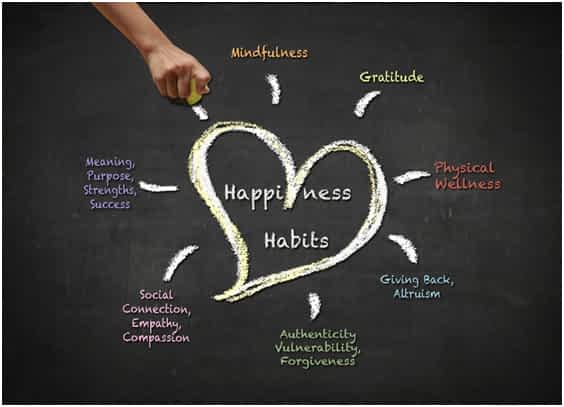

Mindfulness, the ancient practice of focusing non-judgmental awareness on the present moment, is increasingly recognized in today’s scientific community as an effective way to reduce stress, increase self-awareness, enhance emotional intelligence, and effectively manage painful thoughts and feelings.
The mind is highly trainable through various mindfulness practices like meditation, Mindfulness-Based Stress Reduction (MBSR) and Mindfulness-Based Cognitive Therapy (MBCT). Evidence for the efficacy of mindfulness practices in improving psychological well-being continues to grow. There are now nearly 3,500 scientific studies on mindfulness/meditation and the brain in the National Institute of Health’s PubMed database: www.ncbi.nlm.nih.gov/pubmed/?term=mindfulness
Anyone can stand to benefit from cultivating the skills of mindfulness — particularly in our busy modern lifestyles that are often characterized by stress, sleep deprivation, multitasking and digital distractions.
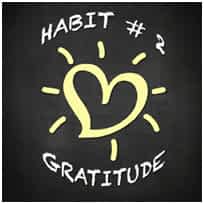
Science has found that gratitude can significantly increase your happiness, and protect you from stress, negativity, anxiety, and depression. Developing a regular gratitude practice is one of the easiest ways to counter the brain’s negativity bias – the tendency to cling to the negative things in our environment. By intentionally focusing on the good parts of our day, the positivity grows. In fact, it only takes 21 days of writing down three things you are grateful for every day to begin reaping the benefits. Moral of the story? Count your blessings – daily, it has a measurably positive effect on our well-being.
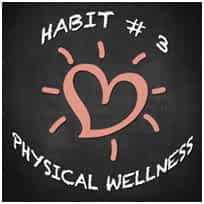
Happiness is good for your health. And vice versa. A review of hundreds of studies has found compelling evidence that happier people have better overall health and live longer than their less-happy peers. Anxiety, depression, pessimism and a lack of enjoyment of daily activities have all been found to be associated with higher rates of disease and shorter lifespans.
What’s more, if you have a good sense of well-being, it’s easier to maintain good habits such as exercising, eating a balanced diet and getting enough sleep, researchers say. People who have an optimistic mindset may be more likely to engage in healthy behaviors because they perceive them as helpful in achieving their goals.
Taking care of your physical wellness may well be the most effective instant happiness booster of all.

Happiness and altruism are intimately linked – doing good is an essential ingredient to being happy, and happiness helps spur kindness and generosity.
Research suggests that how we spend our time and resources is as important, if not more important, than the amount of money we make.
Giving to others releases endorphins, activating the parts of our brains that are associated with trust, pleasure, and social connection. Being altruistic and spending money on others leads to higher levels of happiness than spending it on oneself. Happiness, in turn, increases the chance that we’ll be altruistic in the future, creating a positive feedback loop of generosity and happiness. As the researchers write, “Policies that promote well-being may help to generate a virtuous circle, whereby increases in well-being promote altruism that, in turn, increases well-being. Such a cycle holds the promise of creating a ‘sustainable happiness’ with broad benefits for altruists, their beneficiaries, and society at large.”
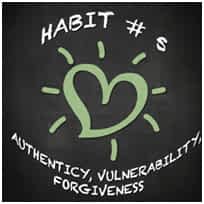
When Dr. Brené Brown conducted thousands of interviews to discover what lies at the root of social connection, a thorough analysis of the data revealed what it was: vulnerability. To be clear, vulnerability does not mean being weak or submissive. To the contrary, it implies the courage to be your authentic self. The rewards of vulnerability are immeasurable. When you embrace an authentic and vulnerable stance to life, people will meet you there in that openness, allowing you to experience true connection.
Forgiveness is a byproduct of living authentically and vulnerably. Forgiveness doesn’t mean tolerance of error but rather a patient encouragement of growth. Practicing forgiveness doesn’t only benefit the person we forgive, recent research shows that it has tangible benefits for ourselves as well. So the next time you’re holding a grudge, try letting it go for your own happiness!
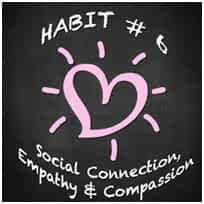
Our busy lives often leave us stretched for time to connect with others, but science suggests that social connection should be at the top of our to-do lists. Dr. Emma Seppala from Stanford’s Center for Compassion and Altruism Research and Education (CCARE) says that when connection with others is present, it can boost mental and physical health, and even increase immunity and longevity.
Relatedly, happiness is collective. Our happiness depends on the happiness of those we are connected to. Science shows that through practicing happiness, we make those we come into contact with happier. In other words, happiness is contagious! This extends to the 3rd degree of contact (a friend of a friend of a friend).
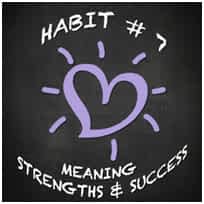
Many people tell themselves, “If I work hard, I’ll be successful. If I’m successful, I’ll be happy.” But recent discoveries in psychology and neuroscience show that this formula is backward: Happiness fuels success, not the other way around. In fact, science has shown that, “The brain at positive is 31% more productive than at negative, neutral or stressed.” ~Shawn Achor, Harvard University
What’s more, researchers have found that the type of work you do is key: engaging in meaningful activity is a big indicator of happiness. As Harvard happiness expert Tal Ben Shahar says, “Happiness lies at the intersection of pleasure and meaning.” In addition to seeking work imbued with a sense of purpose, scientists have discovered that people thrive in environments where their strengths are emphasized. If we are actively involved in trying to reach a goal, or an activity that is challenging but well suited to our skills, we experience a joyful state or what famous psychologist Dr. Mihaly Csikszentmihalyi calls “flow.” The experience of flow in both professional and leisure activities leads to increased positive effect, performance, and commitment to long-term meaningful goals.
So, what’s it going to be?
1) Try to grab some happiness when and where you can, or
2) Follow a scientifically-proven path to happiness?
If you chose number 2, then choose some, or all, of the methods above, and write them down, or copy and paste them into a document. Then, when you are setting up your list in our Morning Rituals section, add them in. You’ll be happy you did!
Now that you’ve found motivation, gotten rid of negative beliefs and learned how to create happiness, go to the Achieving Goals section of this course, your next step in creating a great middle age!